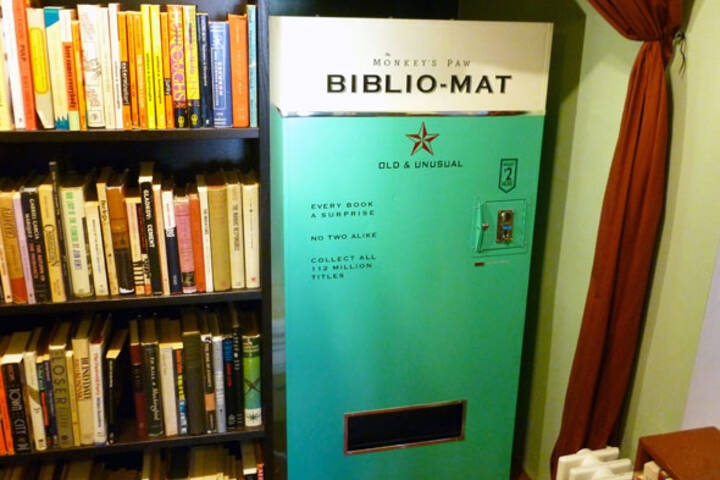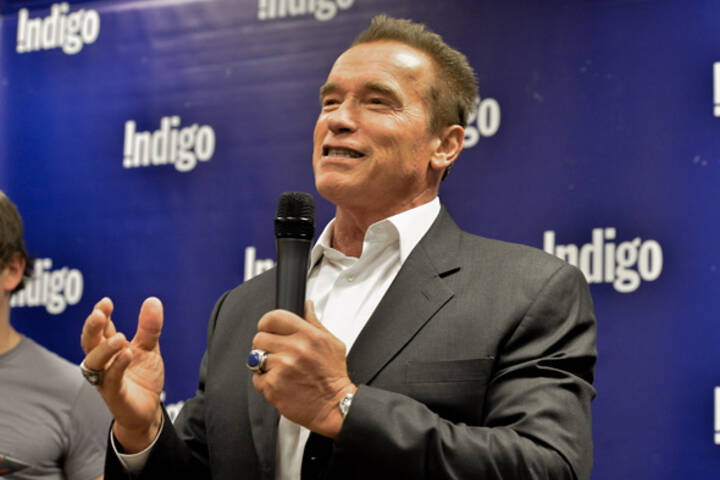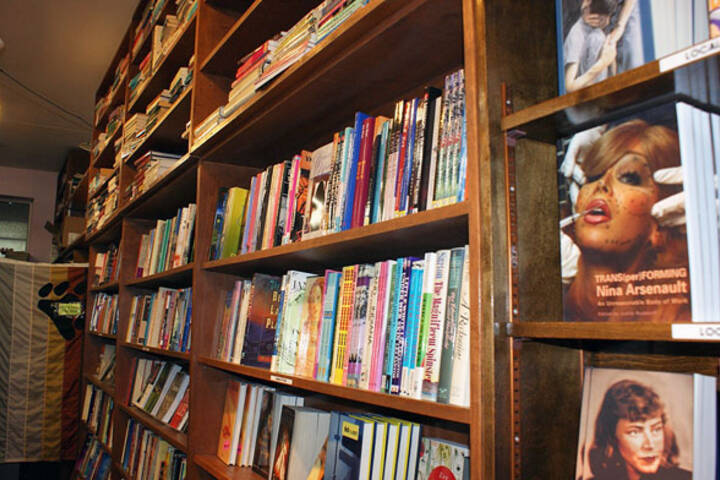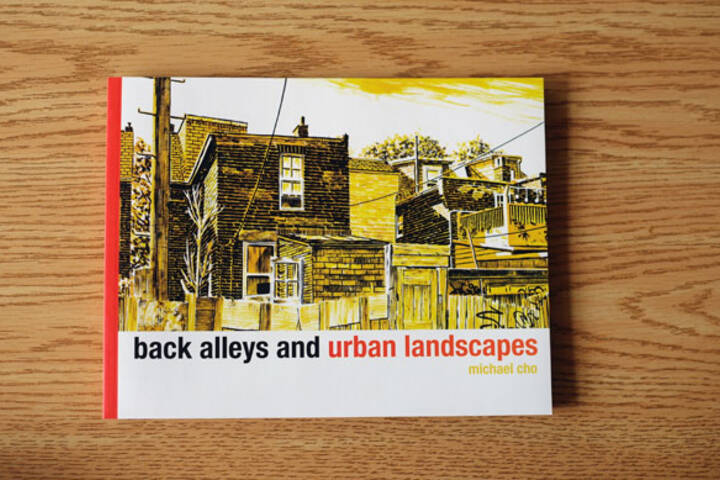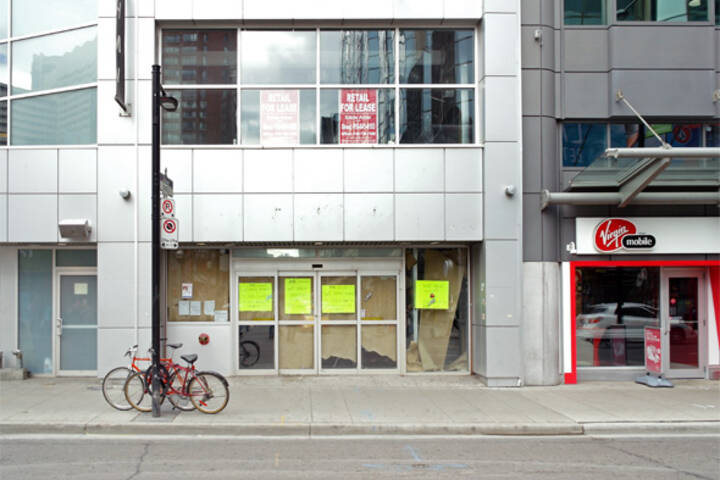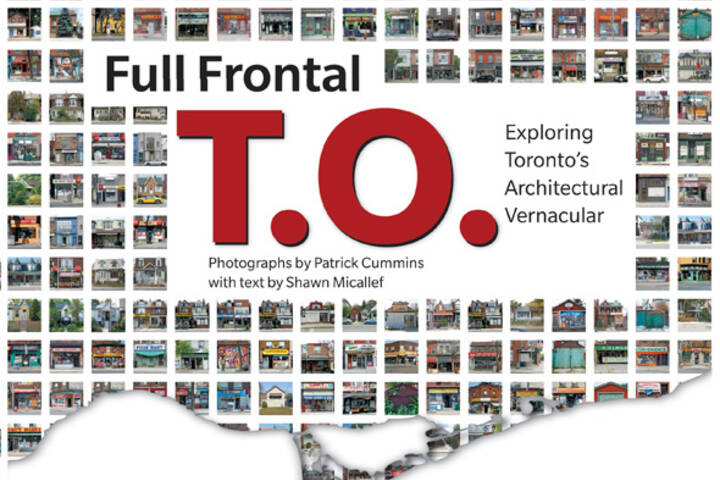
Dead Things ON Sticks: Denis McGrath
On his blog, Dead Things ON Sticks, Toronto screenwriter Denis McGrath describes himself as a recovering television producer & journalist who gets paid to write tv "for a bunch of shows you most likely have never heard of unless you're a Canadian TV geek or have been drunk in a hotel room in Germany at Five a.m."
McGrath has been writing, producing and performing in television for over fifteen years, worked at CityTV and Chum Television, and helped start Canada's science fiction channel, Space: The Imagination Station. His series, Across The River To Motor City, premieres soon in Canada.
I discovered Dead Things ON Sticks while looking for info about when Blood Ties is going to be aired in Canada. McGrath's blog is highly opinionated, sometimes controversial, often funny, but always well-written.
Why did you decide to start your blog? (and out of curiosity, why is the word ON all capitalised?) How would you describe your blog?

I started "Dead Things on Sticks" in August of 2005. 2005 was kind of a weird year for me-- my year of "development hell." I had three series in development, which was cool. But I didn't work on anything that got made. So it was also very isolating and lonely. When you're in production, you tend to go into an office and you have to have lots of meetings, and you have lots of real human contact.
But I live alone, and obviously when I'm not on a show I work alone -- and around the time I started the blog I was beginning to get stir crazy staring out at Lake Ontario and the Gardiner every day. The only human contact I had professionally was various network people I was developing with. And at the risk of offending hardworking network people everywhere, that is simply not a recipe for meaningful human contact.
So I started the blog. Initially I thought it was just going to be a little low-level talk about what I liked on tv, and maybe some process-y stuff about how I write for TV. I've taught screenwriting at Ryerson for years, so I kind of always had that "give somebody a hand up" attitude. But then a lot of the other possibilities started to occur to me.

Screenwriters in Canada were very isolated because they don't work together very often. And the industry in this country is messed up, but no one ever really speaks truthfully about why it's messed up. After a while I decided, the hell with it. I'll do it. It's not like anyone's reading anyway. Then, of course, people started reading. And it got to be a gallows thing, "how does Denis ruin his career this week?" But so far, I've got to say that all the "sky is falling," scared predictions I've gotten from people saying "you can't write things on your blog because people will get back at you" haven't materialized.
I couldn't be busier right now. I guess maybe it's that, deep down, I come from a place of wanting to do better, and wanting to be optimistic, and wanting to serve the audience better. And I think people respond to that, because deep down, everyone wants to be doing better work.
Why's the "ON" capitalised? Just 'cause. Aint I a stinker?
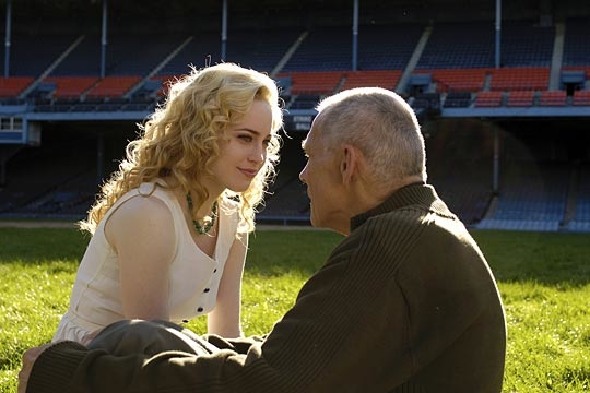
(All Across The Road To Motor City photos in this post: Russ Martin.)
How did you get into screenwriting?
Sideways. I always wanted to write. When I first graduated Ryerson I sent a script I wrote down to L.A. It was a "Wonder Years" spec script and I got really great feedback on it from the Executive Producer of the show. But I didn't follow up. I drifted into TV producing, doing stories on media and technology, first at TVOntario, then at Citytv. I had a wonderful time at Citytv, got to interview a lot of people, but was still restless.
In 1996 I did a play at Summerworks called "Press'd" -- and my boss at the time, Moses Znaimer, brought a Director friend named Jeremy Kagan to the show. And Kagan flipped for my play. He loved the writing. But I never followed up. About a year later, I'm watching the Emmys and there's Jeremy Kagan, accepting an award for Directing "The West Wing," which was my favorite show at the time. And I decided, if I ever got another break like that, I wasn't going to let it pass by.
By this time I'd moved on to help start up Space: The Imagination Station. I met up on-set with a couple of guys producing a show called STARHUNTER. They liked me, I wrote a few eps for their second season, and then I took the big leap. I quit my job and went to the Canadian Film Centre. When I got out, I never looked back. I've been working ever since, first in documentary (I did a lot of lifestyle wedding shows) and now drama.
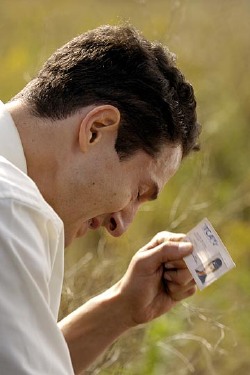
I say all this because now I look back and I think the missed opportunities had purpose. I had to get past my fear. People tend to think that you only get one 'break,' but it's not true. You just have to want it badly enough that you are willing to risk everything. Some get there more quickly because they've got youthful bravado or a natural fearlessness on their side. Some come later to it, once they realize that they won't be happy if they don't really try. But the risk -- taking the risk, is all.
How did you get involved with writing for Blood Ties?
I met the Executive Producer and Showrunner, Peter Mohan, when I was at the Film Centre in 2001. We kept in touch over the years. Blood Ties actually was supposed to go a year or so earlier, but didn't because they couldn't get fully financed. I read some of Peter's initial scripts then and really liked them.
I was a huge fan of Buffy and Angel, and Anne Rice -- but I liked the take on this where, first of all, the female tough talking cop was the protagonist, not the vampire -- and also that the vampire wasn't all broody and sturm and drang...I kind of felt that cursed 'children o'the night' thing was a bit played out.
When the show finally did get going, I wasn't available -- I was doing another show for the same network, CHUM. (Across the River to Motor City, I co-created it and wrote five of the six episodes)
Luckily, my show was only six episodes long and Blood Ties was doing 22. So when they lost a writer (a good friend of mine who wanted to return to T.O. from Vancouver) Peter called me up over Christmas and said, "how you feel about coming out to Vancouver and joining us here?" And I leapt at it -- because I knew Peter was fun, and a good writer with tons of experience, and I'd seen early cuts of the first episodes and really liked what I saw. So I headed out to Vancouver in time to work on the last 9 episodes.
Have you read any of Tanya Huff's Blood books?
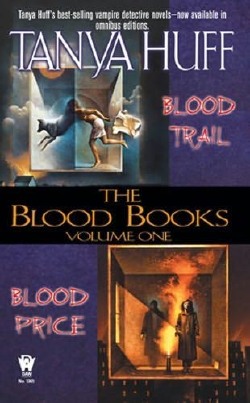
Oh sure. I read the first one when I was at SPACE, cause I was curious about the Toronto setting. And I really enjoyed it. I've dipped into most of the others -- some just before I went out to start. The nice thing about this show is that we really did recognize that Tanya's tone was unique...we really are trying to go with the characters she laid out. And the best thing is, she really appreciates what we're doing, too. She knows how different the two mediums are. It's a bit of an embarrassing love-in, actually. I think Tanya's a hoot and a lot of fun, and she praises us to high heaven every chance she gets. It's awesome.
I should say actually the Blood stories I liked best were the ones in the short story collection. I thought they were super-cool. I even 'borrowed' a plot twist for my first BT ep from one of the stories. Thanks, Tanya!
What's the process when you're writing an episode of Blood Ties?
Notes, notes, notes, and more notes. Tanya wrote a really good bit on her blog about the process of freelancing (she wrote an ep of the series). When you staff it's a bit different. All the writers come up with (or "break") the story as a group. In essence, you figure out what happens in every scene.
Then the writer who's going to write that ep goes out and writes an outline. Then you get notes from the other writers and from the network. You change it. You write a draft. Repeat. Then production concerns come up -- "Can this scene be day instead of night?" "No." "Why Not?" "Because one of our characters in the scene is a vampire." etc, etc. Changes continue right up until the episode is shot. Sometimes you talk to the actors and they have great ideas that you want to incorporate, or the director, or even the network.
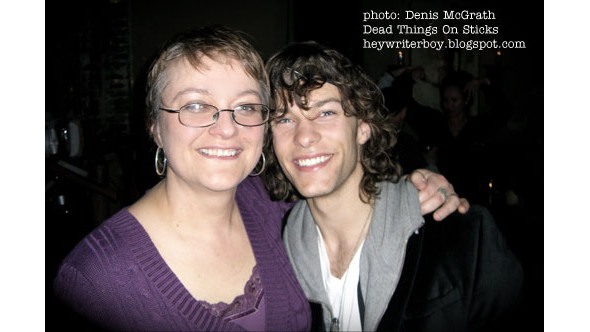
So it's a lot of rewriting, and the trick is to keep it fresh and retain the nut of what you thought was cool about the story in the first place, and not let it get blanded out to a fine paste. It can be a grueling process, but if you like who you're working with, it can be fun, too.
Oh, one more thing -- while you're doing all the above on one episode, there's the ep behind you and two more in front of you that are in different parts of the process, and you're trying to give notes and keep an eye on those eps as well. So it's chaos. You're working 13, 14 hour days. it's not for the faint of heart.
IMDB has you listed as "executive story editor" for nine episodes. What does an executive story editor do?
In TV there's a whole lot of titles that mean the same thing -- they just connote rank and salary level. A staff writer generally just writes their own scripts. A story editor or executive story editor weighs in and rewrites other people's stuff when needed. Sometimes as they move up writers get "producer" credits like Producer or Supervising Producer, up to Executive Producer -- where they have production responsibilities, too -- like they'll be in on casting, or post production -- but the most important thing they do, still, is write.
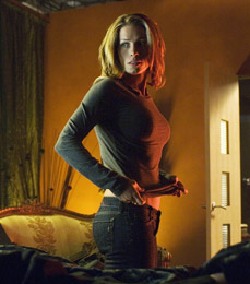
It's all about moving up the ladder so one day you can run your own show. Being a showrunner is a very difficult job because it requires you to know about so many different sides of the business. But that's why it's got to be a writer in that chair -- because only the writer has the full vision of where the story's been and where it's going.
In Canada, the titles are sometimes a bit loosey-goosey'er because there's kind of a fight going on behind the scenes. IN the US the people who are in charge are always writers. In Canada, traditionally the people who have been in charge have been money, or line producers. They're not always the most creative people. Their position is that it's so hard to get financed here that that's the hardest thing to do, so they should be in charge. And Canada loves bureaucracy, and nobody really understands what writers do, so they've been more comfortable with the people who fill out the forms in charge.
But here's the thing: they don't know story as well, and not to put too fine a point on it, that's why a lot of the time, Canadian TV is so terrible. The shows that people actually like -- Corner Gas, Trailer Park Boys -- those are shows where the writers have enough power to influence and fight for their vision.
The good news is that writers are slowly winning that creative war...more and more of us are getting Producer credits and the power to say 'no,' and the power to bring our vision to the screen. I don't want to downplay the role of a producer -- they're really important -- especially in Canada, because more often than not you're working with a much smaller budget. In the U.S. when there's a problem, the answer is usually "throw more money at it." In Canada, that's usually not an option. So having a smart, engaged producer is key.

It's just that, up to now, they've overreached a bit, and tried to be the last word on creative. And in the service of that, they've marginalized writers and tried to treat them as crew, basically. So writers write scripts and then are sent away, and then actors change lines, and directors throw out story in the service of being 'cool.' And producers allow themselves to be talked into cutting scenes for budget that they shouldn't cut, and supporting a director who's looking at putting a pretty shot on his reel, but not necessarily serving the series, and making wardrobe choices or set or location choices that don't serve the material well. Nobody's minding the store.
Then, when they put the show together, the result is something that was push-me-pull-you'd into existence, and it kind of...sucks.
As we get rid of that bad old way of doing things, our homegrown shows are going to get better and better. Viewers will be able to see the difference, like they do with Corner Gas.
According to your IMDB entry, you've written four Blood Ties episodes so far (Drawn & Quartered, The Devil You Know, We'll Meet Again, and The Good, The Bad and the Ugly). Will you be writing more?
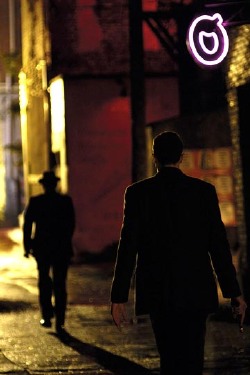
Do I have credit on The Good The Bad? I shouldn't. I cowrote Drawn & Quartered with Dennis Heaton (he's actually the evil Dennis. I'm the good Denis. I'm not actually that good but Dennis is....well....he's just...he wrote FIDO. He's awesome, but...alright, I'm scared of him. There. I said it.) The other two I wrote solo.
I'm jazzed about my eps because they're really, really important eps when it comes to the mythology of the show. I can't really say more. But they're cool. If we get a second season, I would love to write more. I think the eps I wrote turned out really well, and I love, love, love the Blood Ties people. The actors, the crew, the writers -- it was a really positive experience. I hope that when it starts on City TV in August and on Space in the fall that Canadians really embrace this fun little show. It gets really intense as it goes along. And the last set of eps are just killer!
A recent article in the Calgary Herald said that you were "trying to exploit a chaotic situation" for your own benefit. What was that about?
Is this the article where she called me the "Don of the writer mafia?" I have to thank her for that. I got ROASTED about that in Banff all week. Heh heh. What I meant was what I was talking about with the shifting definition of writer-producer-showrunner above. The bad old way of doing things is going away. I think really savvy, really positive, aggressive writers stand to benefit. I really think that Corner Gas and TPB, even Degrassi-- proves Canadians will totally watch our own shows if they're good. I think writers are the people to make them good. I'm going to help prove it.
What are your current projects?
Right now I'm working on a new show for the CBC that's going to premiere in January 2008. It's called "The Border" and it's set in a fictionalized agency that deals with high profile security issues in our post 9/11 world. So immigration, smuggling, terrorists, stuff like that. Not quite a Canadian 24, but definitely an edgy, action-y kind of show that the CBC hasn't done before. And it will play the whole tension thing between the USA and Canada, which I'm really into.
I'm just in the middle of getting my draft done now. We shoot my episode first, even though it's third in the order. I'm excited. I think it's got a chance to be a big hit for CBC. I'm working with a great group of writers and the Executive Producer is Peter Raymont (Romeo Dallaire: Shake Hands With the Devil) so he's bringing a real documentary style realism to it. I think if we're able to keep it edgy and tough, the audience is really going to respond.
And I don't know when they're ever going to schedule it, but at some point my six part mystery series, "Across The River To Motor City," will air on CHUM stations like Bravo! and Citytv. I just hope it doesn't get lost in the shuffle of the chaos of the CHUM sale.
Other than that, I received great feedback on a concept I was pitching in Banff. I think it's probably going to get optioned. I'm also trying to keep myself open in case something cool comes up from somewhere else. I keep hearing that there's a lot of people who want to work with me right now. That's a good feeling. Who am I kidding? It's a great feeling. I feel pretty.
Are there any other questions you'd like me to ask?
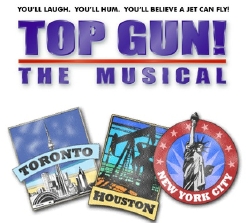
Nope. Except maybe this: If you live in Toronto, and you don't go to see Summerworks and the Fringe, you crazy...that's where you get the chance to see some of the best writing before it goes anywhere. Yeah there's dreck...but those people who get to be all, "I saw Drowsy Chaperone at the Fringe, baby!" sure look like super smartypantsers now, hey? Both festivals have a different feel, and both have been really good to me (I still can't get over how Toronto embraced Top Gun! The Musical.)
TORONTO FAVOURITES:
Favourite restaurant?
I still mourn the Gypsy Co-op and the Bev patio. I like the sushi at The Drake, and the Ribs and the Weekend Brunch at The Banknote. But you can find me an embarrassing amount of time at one of the side booths at The Paddock. The music is eclectic and joyous, Chris the bartender indulges my embarrassing secret love of girly cocktails, and it's just a friendly, low key place to hang out. It's writer nirvana -- perfect for people watching. And the food's good, too. I also have to give a shout out to the Wagamama coffee shop at King and Tecumseth. They make a delicious ham and cheese sammitch.
Favourite bookstore?
Pages at Queen & John. I wish they had more space, because it gets tight in there. But the staff actually knows books, and they have all the eclectic stuff you want. Book City's the business, too. I appreciate not having to wade through stacks and stacks of aromatherapy candles when I just want to get a stinkin book.
You can find out more about Denis McGrath in his blog, Dead Things ON Sticks. -- Debbie Ridpath Ohi
Imbedded links were added by Debbie (so blame her for bad links, not Denis)
Blood Ties airs on CityTV starting Monday August 20 8-10PM
PHOTO CREDITS:
#1,2,7 - Photos of Denis McGrath, Tanya Huff & Kyle Schmid courtesy Denis McGrath.
#4,5,10 - Across The Road To Motor City photos: Russ Martin.
#8,9 - Blood Ties photos: Lifetime Entertainment.
Latest Videos
Latest Videos
Join the conversation Load comments
